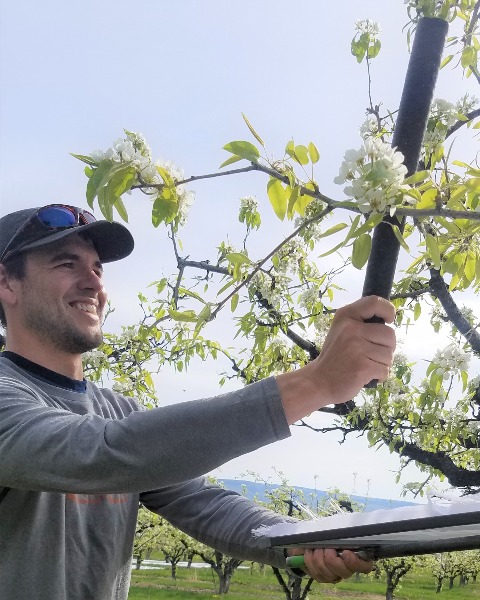P-IE
10-Minute Paper
10-min: P-IE, Horticultural IPM
Working with growers to implement and test reflective groundcovers for pear psylla suppression
On-Demand

Robert Orpet
Washington State University
Wenatchee, Washington
Louis B. Nottingham
Washington State University
Wenatchee, Washington
Presenting Author(s)
Co-Author(s)
Development and adoption of new management tactics is needed to advance sustainable agriculture. Current management of pear psylla (Cacopsylla pyricola) is based on sprays of particle films and insecticides that are costly and often fail to prevent pear psylla damage, making this pest a critical threat to pear industry profitability in the nation's top pear producer Washington State. We previously found in small plot trials that reflective groundcovers repel pear psylla adults, perhaps by interfering with visual orientation behaviors; past studies by other researchers showed similar results in other systems, and reflective groundcovers are sometimes used commercial to improve plant growth in other crops. In the current study, we supplied two reflective groundcover types (mylar and Extenday) to five commercial pear growers who before budbreak in 2020 installed each on a different >0.5 acre plot next to a control plot. Growers left the groundcovers deployed until as early as petalfall and as late as pear harvest. We monitored pear psylla adults (with beat tray taps and sticky cards) and eggs and nymphs (by inspecting leaves) ca. weekly during this time. We interviewed each grower to learn about implementation costs and feasibility of deploying reflective groundcovers at large scale. We found no evidence that ground covers suppressed pear psylla, but four of the five growers were interested in repeating the trial in 2021, primarily out of interest in potential horticultural benefits like larger fruit. This study highlights how trialability and multiple benefits and can promote adoption of management tactics.

